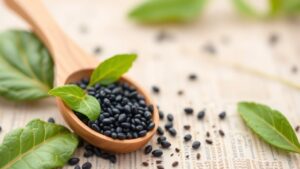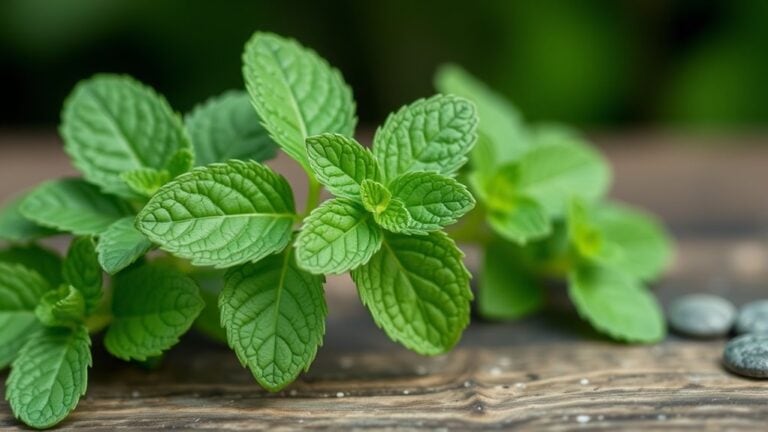Tiny black seeds, often called nature’s concealed gem, pack a powerful punch when it comes to health. These tiny black marvels (also known as ‘black cumin,’ ‘black caraway,’ and sometimes called black cumin) have been used for centuries to tackle everything from stubborn colds to stubborn blood sugar spikes.
They’re loaded with antioxidants that fight off harmful invaders in the body while soothing inflammation that can lead to aches and pains. But their benefits don’t stop there—black seeds also work silently behind the scenes to keep the heart strong, the gut happy, and the skin glowing. Additionally, Nigella sativa seeds are commonly used as a spice in cooking, especially in Middle Eastern and Indian cuisines.
These black seeds also flourish in regions like Eastern Europe. Anyone curious about natural ways to feel better may find these little seeds surprisingly mighty, as they are considered one of the important medicinal plants in various cultures.
Boosts Immune System Function
Black seeds, often called nature’s powerhouse, strengthen the immune system through supporting the body’s defense mechanisms. Rich in antioxidants and anti-inflammatory compounds, they help fight infections and reduce oxidative stress.
Studies suggest black seeds might also improve memory function by protecting brain cells from damage. Their active ingredients, like thymoquinone, augment cognitive abilities by encouraging healthy neurotransmitter activity. Continuous intake supports white blood cell production, which plays a key role in warding off illnesses.
Unlike artificial supplements, black seeds offer a natural way to build resilience without harsh side effects. Black seeds have been used in herbal medicine as a traditional herbal remedy for centuries, valued for their natural therapeutic properties. Their benefits extend beyond immunity, subtly aiding mental clarity and focus. For those seeking comprehensive wellness, incorporating black seeds into daily routines can be a simple yet powerful step toward better health, with potential health benefits supported by both traditional use and emerging research.
Supports Heart Health and Reduces Cholesterol
Beyond strengthening immunity, these tiny seeds also play a role in keeping the heart strong and cholesterol levels in check. Black seeds contain compounds like thymoquinone and healthy fatty acids that help reduce bad cholesterol (LDL) while boosting high density lipoprotein (HDL). This balance supports overall cardiovascular health. Furthermore, black seed oil has been shown to lower cholesterol levels and improve lipid profiles in individuals with metabolic syndrome. Black seeds may help reduce cardiovascular risk factors, including high blood pressure and abnormal lipid profiles. They may also positively influence cardiometabolic risk factors, such as blood pressure, cholesterol, and insulin resistance.
Additionally, the seeds improve circulation by relaxing blood vessels, ensuring oxygen and nutrients reach tissues efficiently. Their anti-inflammatory properties address endothelial function, the lining of blood vessels, promoting smoother blood flow and reducing strain on the heart. Regular consumption can lower blood pressure and decrease plaque buildup in arteries. Clinical studies have demonstrated a blood pressure lowering effect of black seed oil, particularly in individuals with high blood pressure. Improvements in body composition indices have also been observed in some studies involving black seed supplementation.
Aids in Digestion and Gut Health
Since digestive discomfort can make everyday life frustrating, black seeds offer gentle relief through supporting gut health. Their natural compounds help soothe irritation, reduce bloating, and ease indigestion.
Black seeds support gut microbiome balance via fostering beneficial bacteria growth, which strengthens digestion and immune function. They also promote nutrient absorption, ensuring the body gets the most from food.
For those struggling with irregular digestion, black seeds might help regulate bowel movements without harsh side effects. Their anti-inflammatory properties calm an upset stomach, while their fiber content aids smooth digestion.
Whether consumed as oil, powder, whole seeds, ground seeds, or as dietary supplements, they provide a simple, natural way to maintain gut health. Easing discomfort and improving digestive efficiency, black seeds make daily life more comfortable.
Helps Manage Blood Sugar Levels
Black seeds could help regulate blood sugar through supporting glucose metabolism and improving how the body uses insulin. Research indicates they can lessen insulin resistance, making it simpler for cells to take up sugar from the bloodstream. Scientific studies on the effects of black seed have shown improvements in glucose metabolism and insulin sensitivity, highlighting its potential role in managing blood sugar levels.
Consistent intake has additionally been associated with reduced fasting blood sugar levels in certain individuals. Nigella sativa supplementation has also been studied for its potential to support metabolic health and blood sugar regulation.
Supports Glucose Metabolism
Research suggests that black seeds can help regulate blood sugar levels, offering potential benefits for those managing glucose metabolism.
Studies indicate that active compounds in black seeds may support the body’s ability to regulate insulin production, ensuring a balanced release of this key hormone. Additionally, black seeds appear to amplify cellular glucose uptake, helping cells efficiently use sugar for energy rather than letting it accumulate in the bloodstream.
This dual action makes them particularly useful for maintaining stable blood sugar levels. While more research is required, preliminary findings highlight their potential role in metabolic health. Several clinical trials, including randomized controlled trials, have investigated the effects of black seeds on glucose metabolism, providing evidence for their efficacy and safety in this context. For individuals seeking natural ways to support glucose balance, integrating black seeds into their diet could be a promising option alongside other healthy lifestyle choices.
Reduces Insulin Resistance
Beyond supporting glucose metabolism, black seeds can also help tackle insulin resistance, a common barrier to balanced blood sugar. Whenever cells cease responding properly to insulin, blood sugar levels rise, increasing the risk of metabolic disorders.
Black seed compounds strengthen insulin sensitivity, allowing cells to absorb glucose more efficiently. They also regulate endocrine function, helping the body maintain stable insulin production. Research suggests these seeds might enhance how the pancreas releases insulin, reducing strain on the organ.
For those struggling with stubborn blood sugar levels, including black seeds could support long-term metabolic health. Their natural properties work gently, making them a helpful addition alongside dietary and lifestyle changes. Black seed supplementation has been shown in some studies to improve insulin sensitivity and metabolic outcomes. Addressing insulin resistance, black seeds offer another layer of support for maintaining balanced blood sugar.
Lowers Fasting Blood Sugar
For those working to keep their blood sugar in check, black seeds could offer a natural way to lower fasting glucose levels. Research suggests that compounds in black seeds help regulate insulin production, making it easier for the body to process sugar efficiently.
Through improving how cells respond to insulin, these tiny seeds might prevent sudden spikes or drops in glucose, helping maintain stable energy levels throughout the day. Studies also indicate that regular consumption of black seed oil or powder could support long-term blood sugar management, especially for those with metabolic concerns. Additionally, black seed extract has been studied for its effects on fasting blood sugar and metabolic health, with clinical research highlighting its potential benefits in these areas.
While not a replacement for medical treatment, including black seeds into a balanced diet could gently balance blood sugar, offering a supportive approach to overall metabolic health.
Reduces Inflammation and Pain
Black seeds contain natural anti-inflammatory compounds that help ease swelling and discomfort in the body. These powerful anti-inflammatory properties make black seeds especially effective in reducing inflammation and providing therapeutic benefits. Unlike some medications, they offer pain relief without harsh side effects, making them a gentler option.
Their properties also support joint and muscle health, improving mobility and reducing stiffness over time. Black seeds have also been traditionally used to support wound healing due to their anti-inflammatory and tissue-repairing effects.
Natural Anti-inflammatory Properties
One of the most powerful benefits of black seeds is their ability to fight inflammation naturally. Chronic inflammation can lead to various health issues, but black seeds contain antioxidant properties that help reduce swelling and irritation in the body. These compounds work through neutralizing harmful free radicals, which are often the root cause of inflammation. In addition, black seeds possess antiseptic and antibiotic properties, which contribute to their traditional use in managing infections and promoting healing.
Studies suggest that black seeds can also support respiratory health by easing inflammation in the airways, making breathing easier for those with conditions like asthma. In contrast to synthetic anti-inflammatory drugs, black seeds offer a gentler approach without harsh side effects. Their natural compounds target inflammation at its source, providing relief while promoting overall wellness. Black seed oil may also have anti-inflammatory properties that could help with conditions like asthma and psoriasis. This renders them a valuable addition to a balanced, health-conscious lifestyle.
Pain Relief Without Side Effects
- Reduces swelling: Thymoquinone blocks inflammatory chemicals, easing joint and muscle stiffness.
- Soothes nerve pain: Antioxidants in black seeds protect nerves, reducing tingling or burning sensations.
- Non-addictive: Unlike opioids, black seeds relieve pain without withdrawal risks.
- Gentle on digestion: Unlike NSAIDs, they don’t irritate the stomach lining.
For those seeking alternatives to harsh medications, black seeds offer a balanced approach—effective yet gentle. Their versatility makes them a trusted option for long-term relief.
Supports Joint and Muscle Health
Many people struggling with stiff, achy joints or sore muscles find relief in black seeds, thanks to their natural anti-inflammatory properties. The active compounds in black seeds, like thymoquinone, help reduce swelling and ease discomfort, making daily movement easier.
Regular use supports joint flexibility through lubricating tissues and preventing stiffness. For those recovering from workouts or injuries, black seeds amplify muscle recovery by accelerating repair and reducing soreness. Their antioxidants also protect cells from damage, fostering long-term joint and muscle health.
Whether added to meals or taken as oil, black seeds offer a gentle, natural way to manage discomfort without harsh side effects. This makes them a trusted choice for anyone seeking relief while maintaining an active lifestyle.
Improves Skin and Hair Health
Since black seeds have been utilized for generations in traditional medicine, their benefits for skin and hair are supported through both history and modern research. Rich in antioxidants, fatty acids, and vitamins, black seed oil improves skin complexion by lessening inflammation and combating acne. It is also beneficial for various skin conditions, including eczema and psoriasis. Topical Nigella sativa preparations are used for managing skin irritation and promoting wound healing. Black seed oil, along with nigella sativa oil, black cumin oil, essential oil, essential oils, and volatile oil, are all derived from the seeds and contain unsaturated fatty acids and other bioactive compounds. The fixed oil and essential oils from black seeds contribute to their therapeutic effects. It also promotes hair growth by fortifying follicles and deterring breakage. Additionally, black seed oil may help reduce hair loss and improve hair density in individuals experiencing hair thinning.
- Reduces Acne: The anti-inflammatory properties help clear pores and soothe irritated skin.
- Moisturizes Dry Skin: Fatty acids deeply hydrate, leaving skin soft and supple.
- Prevents Hair Loss: Strengthens roots and reduces thinning with regular use.
- Hair Masks for Strength and Scalp Health: Hair masks containing black seed oil are used to improve hair strength and scalp health.
- Fights Dandruff: Antimicrobial properties tackle scalp infections and flakiness.
Regular application of black seed oil or consumption can lead to visibly healthier skin and hair, making it a natural remedy worth integrating into daily routines. However, some individuals may experience an allergic reaction or allergic reactions, especially when using black seed oil topically, and should perform a patch test before widespread use.
Conclusion
Black seeds are like nature’s tiny superheroes, packing a punch far beyond their size. From shielding the immune system to soothing an upset stomach, these little powerhouses prove good things come in small packages. Even in ancient times, healers could have swapped their leeches for a spoonful of black seed oil. With benefits spanning heart health to glowing skin, it’s no surprise they’ve earned their spot as a timeless wellness staple. Black seeds can be eaten raw or lightly toasted, making them versatile in culinary applications.





